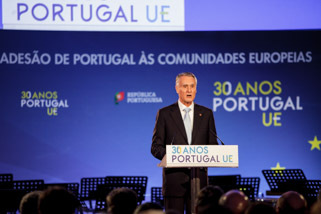
Minister for Health,
Chairman of the Parliamentary Commission for Health,
President of the Society of Physicians and Conference President,
Executive President of the Conference,
Regional Director for Africa of the World Health Organization,
President of the National Commission for Internal Medicine,
I wish to start by congratulating the Society of Physicians, represented by its President, for the organization of the III Conference of the Portuguese Speaking Medical community that coincides with the XIX National Medical Conference and with the V National Conference of Internal Medicine Physicians.
The theme of this Conference, “Physicians and Human Development. The Right to Health, which Future?rdquo; is extremely opportune and personally of great interest to me. The attention I have given to the issue of social exclusion is well known, and I am well aware that health practitioners are endeavouring daily to lessen the suffering and improving the well being of the people.
I am very conscious of the interconnection between sickness and poverty and am concerned with the effects that new poverty situations will have in the health system.
The practice of Medicine determines a maximum level of responsibility and demands vast continuously updated knowledge, very often under difficult working conditions and physically and mentally tiring.
Health practitioners encounter many difficulties in the course of their daily activities in order to answer the concerns and the needs of the people.
The best of Medicine is very often practiced by those who prefer discretion and whose work is unknown to the majority of the people. By reason of their constant effort, many times with personal risks that are seldom given due value, a word of gratitude is deserved by all the Physicians of the Portuguese Speaking Community.
The universal characteristic of the medical profession is privileged ground for cooperation between States and an opportunity for the exchange of experiences and the search of solutions to common issues.
In the global world it is no longer possible to speak about public health in strictly local terms or, for that matter, in national terms. The great risks correspond to threats of planetary dimensions. And I am not just speaking of infectious diseases, which tend to spread at an ever greater speed. I speak also of the factors linked to development and to demographic strain.
We are viewing today, contrary to what would have been desirable, to a widening of the ditch between world regions, to the increase in poverty in many areas of the globe and to the emergence of sicknesses outside the context to which they were generally circumscribed.
It is within this framework of the globalization of threats to health, made worse by an equally global economic crisis, that the interdisciplinary cooperation between health practitioners assumes particular relevance. Physicians will have a central role in defining and materializing the strategies for the defence and promotion of health, as well as in the prevention of sicknesses and their treatment.
It is fundamental that the vast community meeting here today, sharing a common language and history, continue to give an example of human and technical cooperation at the highest level. The existence of a Portuguese Language Medical Community, embracing several Continents and collectively responsible for the health of many millions of people, is the correct answer to issues which pertain to all of us.
I believe that it is even possible to speak about a Portuguese speaking medical culture which may give us, to all who speak the same language, a unique position in contributing to scientific and technical development of Medicine.
I am certain that the prestige of this Portuguese Speaking Community of Physicians will be as great as the greater its capability to promote useful innovation that is adequate to the resolution of problems that others will also have to face. It is thus necessary to identify the collective needs and to provide an early answer to what is recognizably important.
The medical corps must be continually renewed. This renewal of practitioners requires very careful regard by people in government. We need more physicians and young people who will provide continuity to the best that was accomplished by their forbears.
I appeal young physicians to maintain alive the spirit of their profession: a primary interest in the common good. The path to become a physician is long and arduous. To be a good physician is yet more difficult. From the moment when they start to practice, physicians acquire a charter of ethics which results in ever greater responsibilities. But it is exactly this moral capital that provides physicians with a specialized social strength and allows them the people’s respect.
The Societies meeting here today have the duty to impose the most demanding ethical standards to the practice of the profession. The intransigent defence of human life and the primacy of “do no harm” are principles which guarantee to physicians and to the people the trust that is decisive in the physician-patient relationship and which must never be placed in doubt.
To all those who are taking part in these conferences I wish all manner of successes, with the certainty that they will never lose sight of the noble words of the Hippocratic Oath which, shortly, young physicians will repeat. To them, very especially my heartfelt wishes of personal and professional success.
Thank you.
© 2006-2016 Presidency of the Portuguese Republic
You have gained access to the records of the Official Site of the Presidency of the Republic from 9 March 2006 to 9 March 2016.
The contents available here were entered in the site during the 10 year period covering the two mandates of President of the Republic Aníbal Cavaco Silva.